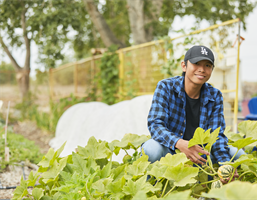
Pro tips to prep your garden for spring
There’s nothing quite like plucking a fresh head of lettuce or the first green bean from your own garden. It’s not only rewarding, it’s good for the environment.
Gardening helps to improve air and soil quality. Plants help protect the soil, recycle nutrients and provide homes for animals. Gardening also helps protect local wildlife and pollinators. Whether you’re new to gardening or you’ve been at it for years, here’s how you can get a head start on growing season.
Plan your bounty
Start thinking about what you want to grow, and how you’ll arrange the garden. Remember that when different plants are grown side by side they sometimes give each other a leg up in becoming hearty, nutrient-rich food. Sometimes called interplanting, this technique has been used for centuries by Indigenous growers, namely with beans, corn and squash – often called the three sisters. Make note of local frost dates and find out what else might grow well together to help you plan out your plot of land.
Check your soil
A healthy garden starts with healthy soil, so when the ground has thawed a little, it’s time to check it out. Toss a handful of soil back and forth from hand to hand. If it’s dark coloured, falls apart easily and smells fresh and alive, then you know you’re in good shape. If it’s not – maybe it seems musty or smells bad – then it’s time to add some compost or manure to the top 10 to 15 centimetres.
Be wary of tilling
While weeding is a good practice, and mulching can help prevent weeds’ return, tilling your soil (i.e. turning it over and breaking it up) should be done with care. Tilling or raking too much can disrupt the activity of worms and microorganisms that keeps it fresh and healthy for plants. Only till in spots where you plan to plant directly or if you are mixing manure into the top of a new garden bed.
While you take on these steps individually, Canadian farmers and agricultural businesses also work to bring responsibly grown food to our tables. Using cutting-edge farming practices, they can help preserve the environment and support community wellbeing. Find more information about how they’re feeding Canadians and growing a better future at canada.ca/taste-the-commitment.
credit – newscanada.com

Leave A Comment
You must be logged in to post a comment.